-
NHS
-
Oldham Services
-
Shop
-
Help & Advice
In recent years, weight loss has become a pressing issue for many people in the UK. With rising obesity rates and growing health concerns, more people are looking for effective ways to shed pounds and improve their well-being through diet, exercise, lifestyle changes, and, more recently, weight loss medications.
In the UK, being overweight or obese is defined using the Body Mass Index (BMI), which measures a person’s weight against their height. An adult is considered overweight if their BMI is between 25 and 29.9, while a BMI of 30 or higher classifies them as obese.
At Click2Pharmacy, we believe in transparency and accuracy when it comes to health information. Our data is sourced from reputable studies, surveys, and health organisations to provide you with the most reliable insights.
In the UK, a significant number of people are focused on losing weight. Recent statistics reveal that 26% of adults are classified as obese, highlighting a pressing public health issue.
When it comes to weight loss efforts, more than 4 in 10 Britons, specifically 43%, report that they are actively trying to shed pounds. This concern extends to children as well, with one in four children in England currently on a diet, indicating that weight management is a priority across various age groups.
According to SERanking, people are searching for various weight loss methods, with the following monthly search volumes:
These figures suggest that many people are looking for quick and effective weight-loss solutions, often alternatives to traditional methods.
The growing cause of the rise in being overweight and obesity in the UK is constantly up for debate, as there is not one cause that can be pinpointed.
Diet and lifestyle choices are often considered the main contributing factors to obesity. Due to the cost and accessibility of takeaways and food deliveries, more people are eating processed and fast foods, which tend to be high in calories but low in essential nutrients. People are using public transport less and driving more, and more jobs are also desk-based, leading to more sitting and less activity overall.
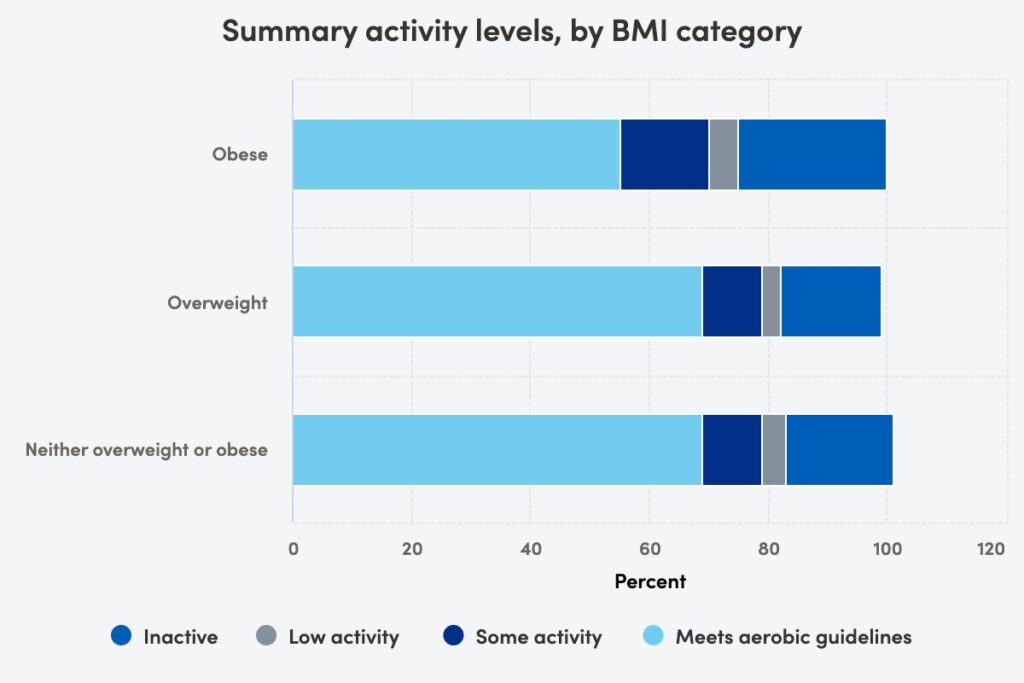
Source: NHS England
Interestingly, exercise alone might not be the answer to losing weight. Research shows that nearly 70% of overweight people and 55% of obese people meet the recommended levels of aerobic activity. This suggests that while exercise is important, it isn’t the only factor.
Certain genes are linked to being overweight, and these account for 25-70% of the differences in body fat. These genes can affect how our bodies process food, store fat, and even influence our behaviours, leading to choices that may increase the risk of obesity, like overeating or being inactive.
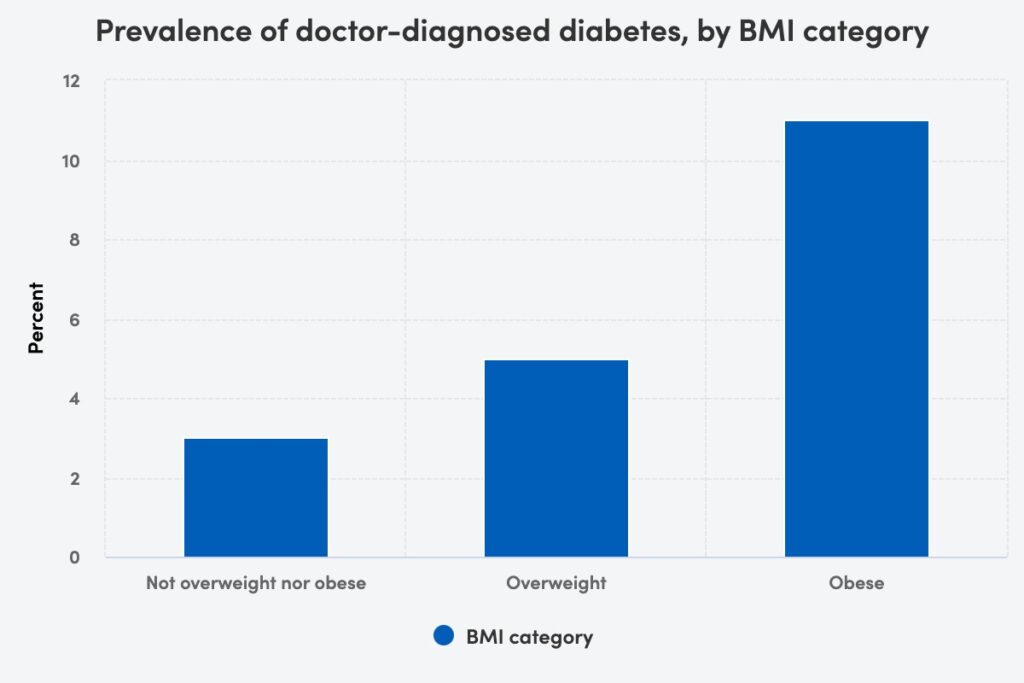
Source: NHS England
People with long-term health issues, like diabetes, are more likely to be overweight or obese. There’s a two-way relationship here, as obesity leads to health problems, and some health issues make it harder to lose weight.
Source: Google Trends
Google Search Trends reveals that interest in weight loss tends to drop in December, likely due to the holiday season filled with festive foods and celebrations, and it peaks in January and the summer months, ready for New Year’s resolutions and getting ‘bikini body ready’.
As people get older, they tend to be more prone to weight gain and obesity-related conditions. Almost three-quarters of people aged 45-74 in England are overweight or obese, and this trend is closely linked to an increase in health issues.
Doctor-diagnosed diabetes increases dramatically with age. While only 1% of adults under 35 have diabetes, this rises to 16% for those aged 75 and over. Similarly, hypertension (high blood pressure) becomes more common as people age. 9% of adults aged 16 to 44 have hypertension, but this jumps to 60% for adults aged 65 and over.
According to the Health Survey England’s Health and Ethnicity report, different ethnic groups have varying patterns of overweight and obesity, with distinct trends for men and women.
When age is taken into account, Chinese men and women are less likely to be overweight or obese compared to other ethnic groups.
Among women, there are notable differences in obesity rates across ethnic groups. Black African, Black Caribbean, and Pakistani women are more likely to be obese compared to women from other ethnic backgrounds.
For men, the proportions of obesity did not vary significantly among most ethnic groups, with the exception of Chinese men, who had lower rates.
Where you live can affect your likelihood of weight gain, and there is a clear link between socioeconomic factors and obesity rates across different areas in the UK.
According to NHS Digital, obesity rates are lower in less deprived areas and higher in more deprived areas. In the least deprived areas, about 20% of adults are obese, while in the most deprived areas, this figure rises to 34%.
This trend is even more noticeable among children. In 2021/22, 6.2% of reception-age children (4-5 years old) in the least deprived areas were obese, whereas 13.6% of children in the most deprived areas were obese.
Search analysis shows that there are also regional differences in interest in weight loss in the UK. People in Northern Ireland are more likely to search for weight loss solutions, followed by Wales, then Scotland, and finally England.
trends.embed.renderExploreWidget(“GEO_MAP”, {“comparisonItem”:[{“keyword”:”weight loss”,”geo”:”GB”,”time”:”2004-01-01 2024-09-03″}],”category”:0,”property”:””}, {“exploreQuery”:”date=all&geo=GB&q=weight%20loss&hl=en-GB”,”guestPath”:”https://trends.google.com:443/trends/embed/”});Source: Google Trends
Gender affects weight gain and obesity rates in several ways. A higher proportion of men (69%) are either overweight or obese compared to women (59%) in the UK, and this trend has been increasing over the years. In 1993, 58% of men and 49% of women were classified as overweight or obese. By 2019, these numbers rose to 68% for men and 60% for women.
The rates have also increased when looking specifically at obesity. For men, obesity rose from 13% in 1993 to 27% in 2019. For women, the increase was from 16% to 29% over the same period. Most of this rise occurred between 1993 and 2001, with more gradual increases since then.
About 70% of men engage in at least 150 minutes of moderate activity or 75 minutes of vigorous activity each week, compared to 59% of women. This shows that exercise alone is not the main cause, and it could be due to other factors.
Women are more likely to have long-term health conditions, with approximately 43% reporting having at least one longstanding condition, while this figure is lower for men, at 37%. This higher rate of chronic conditions among women may contribute to their overall health challenges and impact their weight management.
Many people find losing and maintaining weight challenging, and research shows that people are likely to regain it again over time. In a survey of 2,000 people, nearly 79.7% of those who lost weight in the last five years experienced weight regain.
A meta-analysis of 29 long-term weight loss studies found that over half of the lost weight was regained within two years, and over 80% had been regained by the five-year mark.
There are several reasons why keeping weight off is so challenging:
Being overweight or living with obesity affects more than just physical health; it can have a big impact on mental health and overall well-being, too. Research shows that people living with obesity are nearly twice as likely to have poor mental health compared to those at a healthy weight.
There’s a two-way link between mental health problems and obesity. Conditions like depression can often lead to weight gain, while obesity can lead to depression. This creates a cycle that can be hard to break. For people with mental health issues, food might be used as a way to cope with emotions. They may also find it harder to stick to healthy eating habits or weight loss programs.
A survey found that six in ten British people living with obesity or severe obesity say they have felt low self-esteem. This low self-esteem can affect many areas of life, from relationships to job prospects. The constant pressure from society to be thin, combined with negative stereotypes about overweight people, can make these feelings worse. Many people find themselves avoiding social situations or struggling to pursue their goals because of how they feel about their weight.
The daily struggle of trying to manage weight can be frustrating and discouraging. This emotional strain can make it even harder to make healthy choices, creating a cycle that’s tough to break out of.
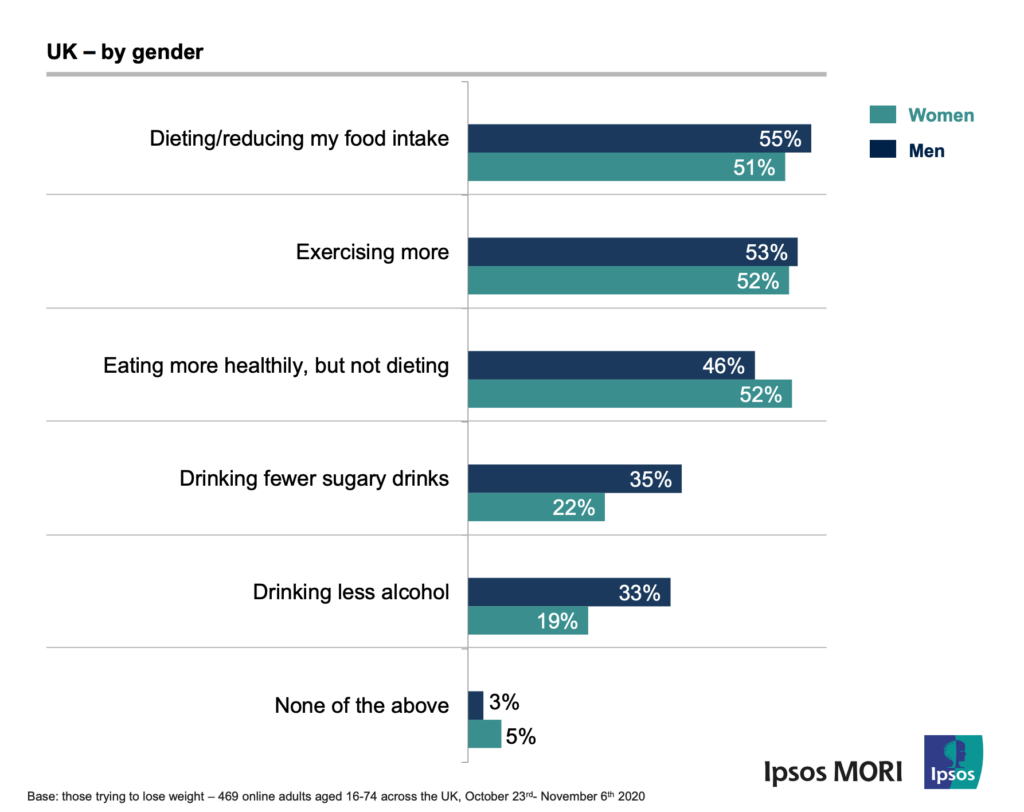
Source: IPSOS
A recent study found that the ways we choose to lose weight differ depending on gender. Women tend to focus more on eating healthily and exploring various options to shed pounds, whereas men are more likely to cut back on sugary drinks and alcohol.
Some of the most popular weight loss methods in the UK include:
It’s worth noting that the study didn’t consider the use of weight loss medications as part of a weight management plan. This is because these medications have only recently gained popularity in the UK. As more people become aware of and have access to these medications, they may become a more common approach to weight loss.
The weight loss industry has changed dramatically over the last couple of years. Instead of treating weight loss as something we must do on our own, there is now an option of ‘treatment for being overweight and obese’. These medications help people lose body weight through various mechanisms, including hormonal changes and appetite suppression.
They primarily come in two forms: injections and tablets. Injections deliver active ingredients directly into the bloodstream, while tablets are a convenient oral option.
As awareness and accessibility of these treatments increase, they are becoming a more popular option for those who haven’t had any success with more traditional weight loss methods.
Due to the recent surge in popularity of weight loss medications and the limited research on their use in the UK, we’ve turned to our own data to gauge their popularity. At Click2Pharmacy, we are a leading provider of weight loss medications in the UK, and our sales figures offer valuable insights into current trends.
Our analysis is based on data collected over the past year, providing a snapshot of the evolving weight loss medication market in the UK. While this data may not represent the entire UK market, it’s a reliable indicator of consumer preferences and emerging weight loss treatment patterns.
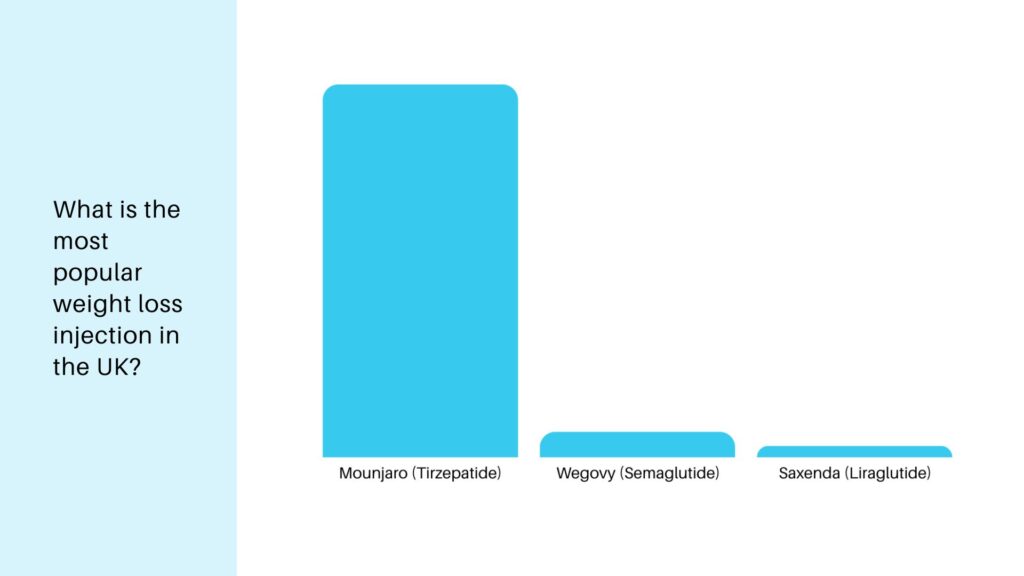
Source: Click2Pharmacy
According to our data, Mounjaro is the UK’s most popular weight loss injection, surpassing other options like Wegovy and Saxenda. Mounjaro’s popularity can be explained by its effectiveness in helping people lose weight, along with its side effect profile and convenient dosing schedule.
The reviews for Mounjaro have found it leads to better results than traditional weight loss methods, which increases their satisfaction with the treatment and encourages them to stick with it. This combination of effectiveness and ease of use makes Mounjaro a top choice for those looking for help with weight management.
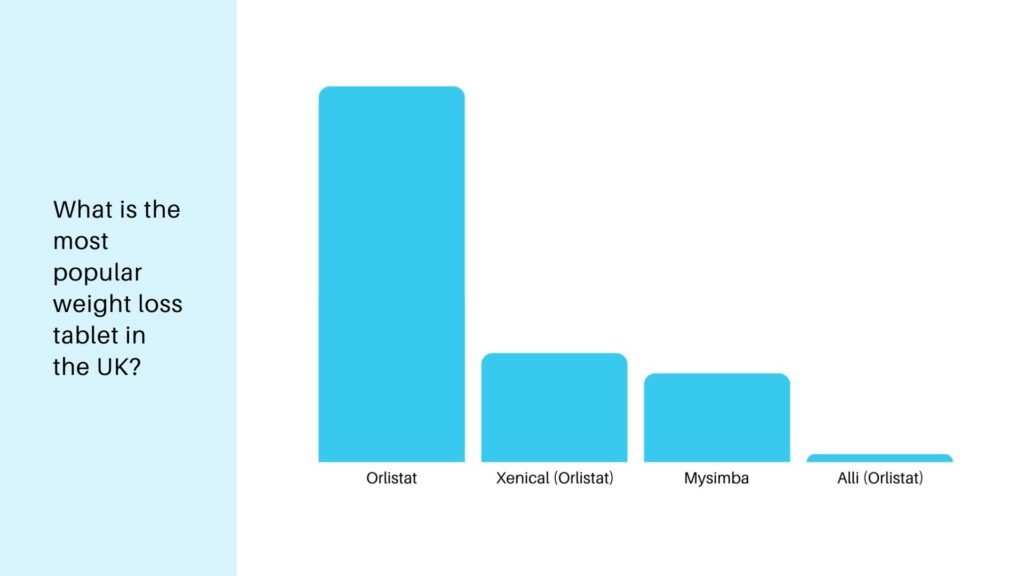
Source: Click2Pharmacy
Unbranded Orlistat is the UK’s most popular weight loss pill, followed by Xenical (branded Orlistat), MySimba, and Alli (branded Orlistat). Many people prefer unbranded Orlistat because it is often more affordable while providing the same effectiveness as the branded version.
The familiarity of Orlistat as a long-standing treatment for weight management also contributes to its popularity. Since it was available in 2009, both prescribers and patients have been well-acquainted with its benefits and how it works. This combination of cost-effectiveness and trust in the medication makes unbranded Orlistat a top choice for those looking to manage their weight.
People are actively looking for information on the most effective weight loss medications. This trend suggests a growing awareness and acceptance of medical interventions for weight management. People will likely compare different options to find the treatment that best suits their needs and goals.
There is an obvious correlation between searches for weight loss medications and diabetes. This connection highlights the dual benefits of some medications, which can help manage both weight and blood sugar levels. It also shows that people with diabetes are increasingly exploring weight loss options as part of their overall health management.
Searches linking weight loss medications to PCOS (Polycystic Ovary Syndrome) are on the rise. This trend reflects the growing understanding of the relationship between PCOS and weight management, with many looking for treatments that can address both conditions at the same time.
The side effects of weight loss medications are a significant concern, as seen by the high volume of searches related to this topic. This trend suggests that while people are interested in these medications, they’re also cautious and want to be well-informed about potential risks before starting treatment.
Ozempic, initially developed for diabetes treatment, has gained considerable attention for its off-label use in weight loss. However, the surge in demand has led to supply issues.
As a result, some UK pharmacies have stopped selling it as a weight loss drug to ensure availability for diabetes patients. This situation has sparked increased searches about the medication’s availability and alternative options for weight loss.

